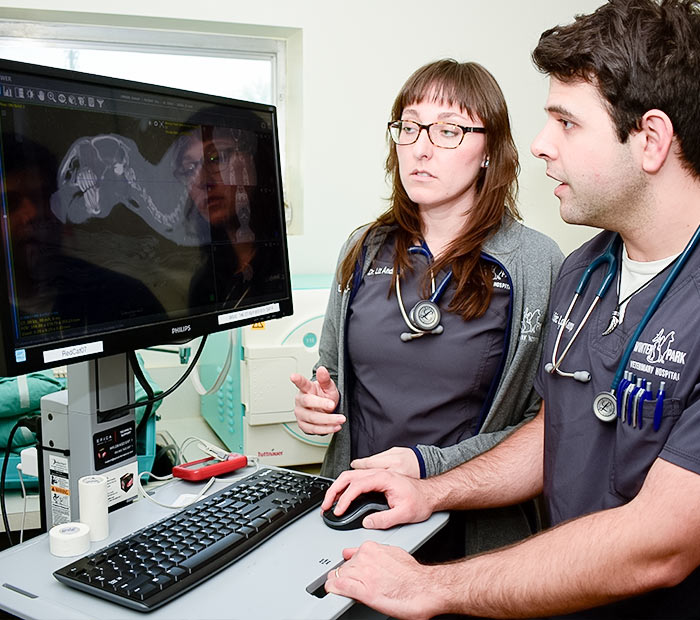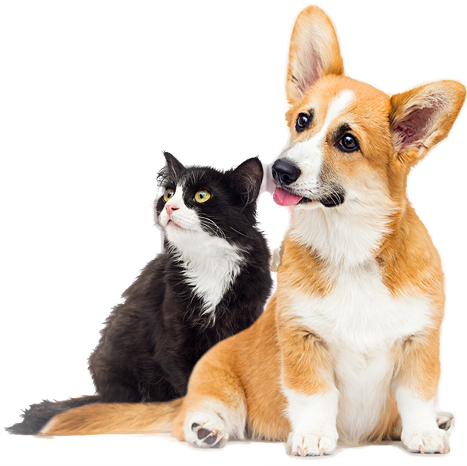Advanced Dental Care
At Winter Park Veterinary Hospital, we prefer to save your pet’s teeth. However, there are many advanced dental conditions which require the extraction of teeth and advanced dental procedures. These include advanced periodontal disease, chronic gingivitis/stomatitis, and severely fractured teeth.
COMPUTED TOMOGRAPHY (CT) SCAN – PROVIDES ADVANCED DIAGNOSTIC DENTAL CARE
Winter Park Vet uses CT (Computed tomography) technology during dental procedures. We take a CT scan of our dental patients to get a full 3d representation of their mouth and sinus cavity to better diagnose and evaluate the condition of their teeth. This also helps us catch some oral and sinus tumors early before they cause an issue. This in-hospital advanced imaging technology creates a cone shaped x-ray beam that rotates completely around your pet’s head and produces highly accurate radiographic images for the diagnosis, planning and treatment of oral and maxillofacial surgery.

“Our veterinary team uses this technology to assess oral and sinus tumors/masses, temporomandibular joint (TMJ) disease, and dental disease. With expanded diagnostic imaging capability and specialty surgery under one roof, the veterinary team at Winter Park Vet is committed to innovative, high quality care for your pet. As Your Vet for Life, our hospital team is dedicated to healing and helping.
Geriatric Dentistry
We excel at providing the highest quality anesthesia monitoring, protocols and care to our older patients that are at greater risk of going under anesthesia. We received referrals from many DVMS throughout Central Florida to handle challenging and complex dental cases on high-risk patients due to our skill and uncompromising level of care.
ORAL SURGERY AND EXTRACTIONS
Tooth Extraction
Tooth extraction is a surgical procedure. The most common reasons for tooth extraction in dogs are periodontal disease and tooth fracture, and in cats tooth resorption and stomatitis. If the disease process is too advanced for the teeth to be saved, extraction is necessary.
Our trained veterinarians will recommend tooth extraction if we believe your pet will medically benefit from the extraction(s). A bad tooth, just like a bad apple, can be a liability to your pet rather than an asset. The risks to your pet’s health are greater if the tooth or teeth are not treated or extracted. The potential for infection, pain, or disease progression will far outweigh any negative effects of extraction.
If extractions are indicated, we minimize your pet’s discomfort by using pain medication before, during, and after the extraction(s). Our patients go home on a soft diet while the tissue at the extraction site heals and often act happier after the extraction because they are free from tooth pain.
Oral Tumors in Dogs and Cats
Tumors in a pet’s mouth are more common than you think, and just like in humans, they can be benign or malignant. You may be able to visualize them at home especially if you routinely brush your pet’s teeth or your regular veterinarian may see one during a routine annual exam. Either way, it is important to find out what kind of tumor your pet is growing. By taking a small sample (incisional biopsy) or removing the bulk of the tumor (excisional biopsy) for analysis by a histopathologist, we are able to understand how the tumor behaves in the mouth and the best treatment option. Either sample must be obtained under general anesthesia. We will work closely with you, the pet owner, to tailor a specific treatment plan for your pet.
All oral growths, small or large, should be evaluated by an experienced veterinarian. Do not hesitate to contact our office if you suspect or see an oral mass in your pet.
ABNORMALITIES OF THE BONE, GUM AND TEETH
Oronasal Fistula Repair
Oralnasal fistulae are commonly treated through surgery to correct abnormal tracts that develop from the oral cavity to the nasal cavity or sinuses. This draining tract or fistula occurs in dogs and cats, and can lead to chronic sneezing and nasal discharge from one or both nostrils.





